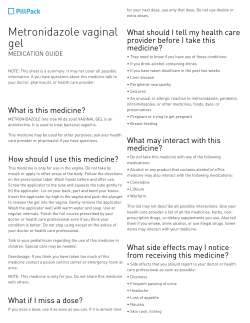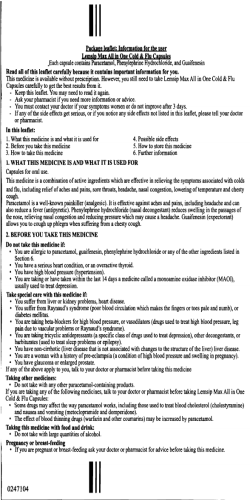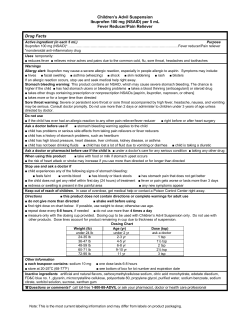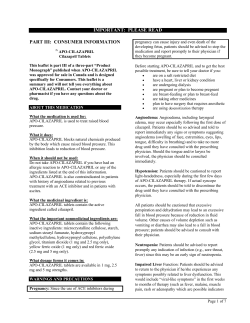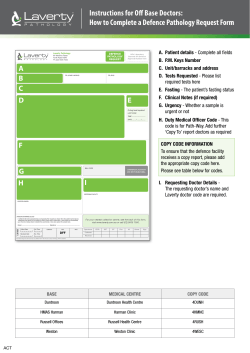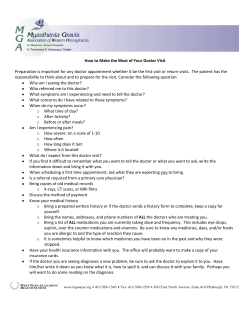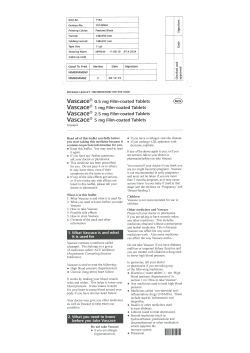
INFORMATION FOR THE CONSUMER IMPORTANT INFORMATION YOU SHOULD KNOW ABOUT APO-OMEPRAZOLE
INFORMATION FOR THE CONSUMER IMPORTANT INFORMATION YOU SHOULD KNOW ABOUT Pr APO-OMEPRAZOLE (Omeprazole Delayed-Release Capsules) Read this leaflet carefully. It contains general points about APO-OMEPRAZOLE and should add to more specific advice from your doctor or pharmacist. WHAT IS APO-OMEPRAZOLE USED FOR AND HOW DOES IT WORK? APO-OMEPRAZOLE is the brand name for a drug called omeprazole. The most common uses of APO-OMEPRAZOLE are: · · · · for stomach ulcers or for duodenal ulcers; including ulcers caused by infection with a bacterium called Helicobacter pylori; for ulcers caused by your medicine for pain and joint problems (NSAID-associated gastric and duodenal ulcers); for reflux esophagitis (tissue damage caused by stomach contents flowing back up the food pipe); and for symptoms of reflux disease such as heartburn and regurgitation. APO-OMEPRAZOLE may also be used in rare conditions like "Zollinger-Ellison syndrome", where the stomach produces large amounts of acid. APO-OMEPRAZOLE works by reducing the amount of acid made in your stomach. This helps in treating acid-related and bacteriarelated stomach problems. Your doctor will have explained why you are being treated with APO-OMEPRAZOLE and will have told you what dose to take. Follow those directions carefully. They may differ from the information contained in this leaflet. WHAT IS IN APO-OMEPRAZOLE? Each APO-OMEPRAZOLE capsule contains omeprazole as the active ingredient. In addition, it contains the following non-medicinal ingredients (listed in alphabetical order): eudragit, gelatin, magnesium hydroxide, mannitol, povidone, red iron oxide, titanium dioxide and triethyl citrate. Check with your doctor if you think you might be allergic to any of the above ingredients. WHAT SHOULD I TELL MY DOCTOR BEFORE TAKING APO-OMEPRAZOLE? Tell your doctor · about all health problems you have now or have had in the past; · about severe liver problems you have now or have had in the past; · about other medicines you take, including ones you can buy without a prescription. Drug effects may be influenced if APO-OMEPRAZOLE is taken at the same time as some drugs used to prevent fungal infections (itraconazole, ketoconazole, voriconazole), anxiety (diazepam), epilepsy (phenytoin), blood clotting (warfarin or other vitamin K blockers), in Page 1 of 5 INFORMATION FOR THE CONSUMER · · · transplant patients (tacrolimus), poor circulation in the legs (cilostazol)*, heart problems (digoxin), treatment for tuberculosis (rifampin) and St. John’s Wort (hypericum performatum); if you are taking medication for HIV. APO-OMEPRAZOLE may decrease the effectiveness of some drugs used for HIV treatment; atazanavir and nelfinavir should not be used with APO-OMEPRAZOLE; if you are taking clopidogrel, which is used for the prevention of blood clots. APOOMEPRAZOLE may interact with this drug, therefore use with clopidogrel is not recommended; if you are pregnant, plan to become pregnant or are breastfeeding. *not marketed in Canada WHEN SHOULD APO-OMEPRAZOLE NOT BE USED? If you are allergic to omeprazole or any of the other ingredients in APO-OMEPRAZOLE (see “What is in APO-OMEPRAZOLE?”). HOW DO I TAKE APO-OMEPRAZOLE PROPERLY? Capsules should be swallowed whole. DO NOT open, divide, crush or chew the capsules. Take all doses of APO-OMEPRAZOLE, as recommended by your doctor, even when you feel well. Daily doses are needed to help damaged areas heal. In general, the recommended dose for treating acute disease is 10 to 40 mg once a day for 2 to 8 weeks. Your doctor may recommend that you continue taking APO-OMEPRAZOLE 10 to 40 mg to control symptoms of reflux disease or to prevent reflux esophagitis from coming back, or APO-OMEPRAZOLE 20 mg to prevent ulcers from returning while you continue to take your medicine for pain and joint problems. APO-OMEPRAZOLE may be used in combination therapy with antibiotic drugs for one week to treat ulcers caused by Helicobacter pylori. If your ulcer is bothering you, your doctor may recommend further treatment with APO-OMEPRAZOLE to make sure that your ulcer is healed. If you are given APO-OMEPRAZOLE in combination with antibiotic drugs, it is important that you take all medications at the correct time of day and for the entire treatment period, to ensure they will work properly. Studies have shown that patients who take their medications as prescribed have better ulcer healing rates and greater success getting rid of their H. pylori infection. Take APO-OMEPRAZOLE until your doctor tells you to stop. Even if you start to feel better in a few days, your symptoms may return if APO-OMEPRAZOLE is stopped too soon. APOOMEPRAZOLE needs to be taken for the full duration of treatment to help correct acid problems. If you miss a dose of APO-OMEPRAZOLE and remember within 12 hours, take it as soon as possible. Then go back to your regular schedule. However, if more than 12 hours have passed when you remember, do not take the missed capsule. Do not double the dose. Just take your next dose on time. Page 2 of 5 INFORMATION FOR THE CONSUMER APO-OMEPRAZOLE may be taken with food or on an empty stomach. ARE THERE ANY SIDE EFFECTS? Like any medication, APO-OMEPRAZOLE may cause side effects in some people. Side effects that do occur are usually mild and go away a short time after starting APO-OMEPRAZOLE. Talk with your doctor if you suffer from any of these effects or if you get any other unusual or unexpected symptoms. These side effects may not be caused by APO-OMEPRAZOLE in your case, but only a doctor can assess this. Common side effects that may occur (frequency of greater than or equal to 1 in 100 patients): · Headache, diarrhoea, constipation, abdominal pain, nausea/ vomiting, and excess gas in stomach (flatulence). Uncommon side effects that may occur (frequency of greater than or equal to 1 in 1000 patients, but less than 1 in 100 patients): · Dizziness, sensation of movement of one’s self or of one’s surroundings (vertigo), difficulty sleeping, feeling sleepy, sensation of burning/ prickling/ numbness, skin reactions (such as skin rash, dermatitis, itchy skin and/or hives) and feeling ill. Rare side effects that may occur (frequency of less than 1 in 1000 patients): · Dry mouth, inflammation in the mouth, gastrointestinal fungal infection, kidney and liver problems (i.e., inflammation of the kidney, inflammation of the liver with or without jaundice, impaired liver function), blood disorders (reduced number of cells in the blood, low blood sodium), sore joints and muscles, muscular weakness, development of breasts in males, sensitivity to sunlight, severe skin reactions, hair loss, hypersensitive (allergic) reactions (such as swelling of tissues, fever, discomfort/ tightness in chest and anaphylactic shock), increased sweating, blurred vision, and taste disorders. If you already have severe liver disease, you may experience disorientation/ aggression/ confusion/ decreased consciousness. If you are very ill, you may feel confused, nervous, depressed or hallucinate. Very rare side effects that may occur (frequency of less than 1 in 10000 patients) include low blood magnesium. Treatment in combination with antibiotics: If you experience symptoms such as severe (bloody or repeated watery) diarrhea, with or without fever, abdominal pain or tenderness, you may have bowel inflammation caused by a bacterial infection (Clostridium difficile). If this happens call your doctor or pharmacist immediately and stop taking the drug combination. Other unwanted effects, which cannot be predicted, may occur in rare cases. If you experience any bothersome or unusual effects while using APO-OMEPRAZOLE, check with your doctor or pharmacist right away. Page 3 of 5 INFORMATION FOR THE CONSUMER WHAT SHOULD I DO IN CASE OF OVERDOSE? In case of drug overdose, contact a health care practitioner, hospital emergency department or regional Poison Control Center immediately, even if there are no symptoms. No severe symptoms have been seen in patients who have taken doses up to 400 mg. WHERE SHOULD I KEEP APO-OMEPRAZOLE? Keep all capsules in their container until it is time for a dose. If you do not, moisture from the air may damage the capsules. Remember to keep APO-OMEPRAZOLE well out of reach of children. APO-OMEPRAZOLE should be stored at room temperature (15 to 30ºC), in tightly closed and moisture resistant containers. Do not keep APO-OMEPRAZOLE in the bathroom medicine cabinet or other warm, moist places. Do not use APO-OMEPRAZOLE after the expiry date marked on the pack. Important Note: This leaflet alerts you to some of the times you should call your doctor. If you experience symptoms that may indicate a more serious stomach or intestinal problem, you should contact your doctor immediately. Such symptoms may include any of the following: difficulty swallowing, unintentional weight loss, vomiting blood or food, or black (blood-stained) stools. Other situations which cannot be predicted may arise. Nothing in this leaflet should stop you from calling your doctor or pharmacist with any questions or concerns you have about using APOOMEPRAZOLE. NOTE: This INFORMATION FOR THE CONSUMER leaflet provides you with the most current information at the time of printing. Please refer to the Patient Information Leaflet located at www.apotex.ca, to see if more up-to-date information has been posted. Date of revision: December 15, 2010 Page 4 of 5 INFORMATION FOR THE CONSUMER REPORTING SUSPECTED SIDE EFFECTS You can report any suspected adverse reactions associated with the use of health products to the Canada Vigilance Program by one of the following 3 ways: · · · Report online at www.healthcanada.gc.ca/medeffect Call toll-free at 1-866-234-2345 Complete a Canada Vigilance Reporting Form and: · Fax toll-free to 1-866-678-6789, or · Mail to : Canada Vigilance Program Health Canada Postal Locator: 0701D Ottawa, ON K1A 0K9 Postage paid labels, Canada Vigilance Reporting Form and the adverse reaction reporting guidelines are available on the MedEffectTM Canada Web site at www.healthcanada.gc.ca/medeffect. NOTE: Should you require information related to the management of side effects, contact your health professional. The Canada Vigilance Program does not provide medical advice. Page 5 of 5
© Copyright 2025


